2018-2019届太原五中高二年级阶段性测试-英语3月试卷
2018届山西省太原市第五中学高三下学期3月阶段性练习英语试题(附答案)
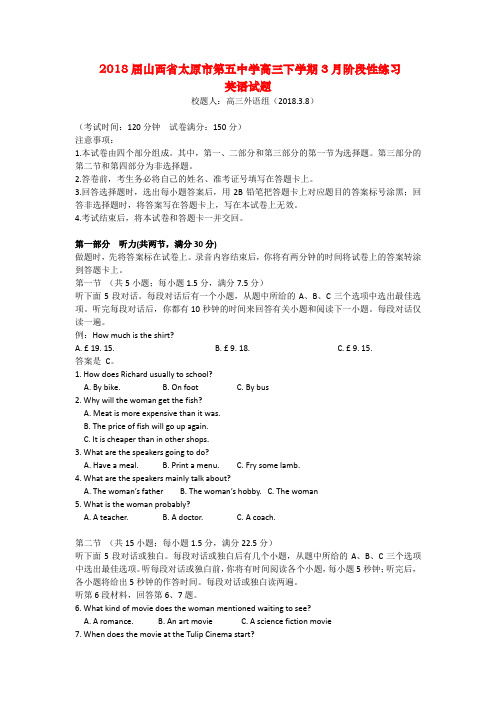
2018届山西省太原市第五中学高三下学期3月阶段性练习英语试题校题人:高三外语组(2018.3.8)(考试时间:120分钟试卷满分:150分)注意事项:1.本试卷由四个部分组成。
其中,第一、二部分和第三部分的第一节为选择题。
第三部分的第二节和第四部分为非选择题。
2.答卷前,考生务必将自己的姓名、准考证号填写在答题卡上。
3.回答选择题时,选出每小题答案后,用2B铅笔把答题卡上对应题目的答案标号涂黑;回答非选择题时,将答案写在答题卡上,写在本试卷上无效。
4.考试结束后,将本试卷和答题卡一并交回。
第一部分听力(共两节,满分30分)做题时,先将答案标在试卷上。
录音内容结束后,你将有两分钟的时间将试卷上的答案转涂到答题卡上。
第一节(共5小题;每小题1.5分,满分7.5分)听下面5段对话。
每段对话后有一个小题,从题中所给的A、B、C三个选项中选出最佳选项。
听完每段对话后,你都有10秒钟的时间来回答有关小题和阅读下一小题。
每段对话仅读一遍。
例:How much is the shirt?A. £ 19. 15.B. £ 9. 18.C. £ 9. 15.答案是C。
1.How does Richard usually to school?A. By bike.B. On footC. By bus2. Why will the woman get the fish?A. Meat is more expensive than it was.B. The price of fish will go up again.C. It is cheaper than in other shops.3.What are the speakers going to do?A. Have a meal.B. Print a menu.C. Fry some lamb.4. What are the speakers mainly talk about?A. The woman’s fatherB. The woman’s hobby.C. The woman5. What is the woman probably?A. A teacher.B. A doctor.C. A coach.第二节(共15小题;每小题1.5分,满分22.5分)听下面5段对话或独白。
2018届山西省太原市第五中学高三下学期3月阶段性练习 英语
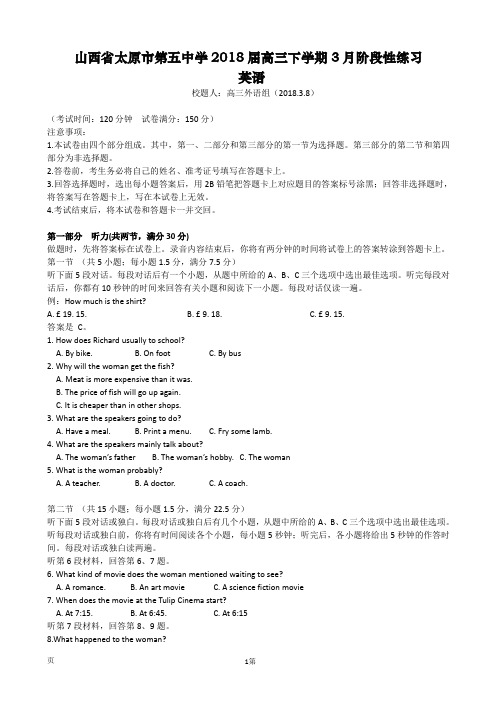
山西省太原市第五中学2018届高三下学期3月阶段性练习英语校题人:高三外语组(2018.3.8)(考试时间:120分钟试卷满分:150分)注意事项:1.本试卷由四个部分组成。
其中,第一、二部分和第三部分的第一节为选择题。
第三部分的第二节和第四部分为非选择题。
2.答卷前,考生务必将自己的姓名、准考证号填写在答题卡上。
3.回答选择题时,选出每小题答案后,用2B铅笔把答题卡上对应题目的答案标号涂黑;回答非选择题时,将答案写在答题卡上,写在本试卷上无效。
4.考试结束后,将本试卷和答题卡一并交回。
第一部分听力(共两节,满分30分)做题时,先将答案标在试卷上。
录音内容结束后,你将有两分钟的时间将试卷上的答案转涂到答题卡上。
第一节(共5小题;每小题1.5分,满分7.5分)听下面5段对话。
每段对话后有一个小题,从题中所给的A、B、C三个选项中选出最佳选项。
听完每段对话后,你都有10秒钟的时间来回答有关小题和阅读下一小题。
每段对话仅读一遍。
例:How much is the shirt?A. £ 19. 15.B. £ 9. 18.C. £ 9. 15.答案是C。
1. How does Richard usually to school?A. By bike.B. On footC. By bus2. Why will the woman get the fish?A. Meat is more expensive than it was.B. The price of fish will go up again.C. It is cheaper than in other shops.3. What are the speakers going to do?A. Have a meal.B. Print a menu.C. Fry some lamb.4. What are the speakers mainly talk about?A. The woman’s fatherB. The woman’s hobby.C. The woman5. What is the woman probably?A. A teacher.B. A doctor.C. A coach.第二节(共15小题;每小题1.5分,满分22.5分)听下面5段对话或独白。
山西省太原五中2018届高三3月阶段练习英语试卷【附答案】

太原五中2017—2018学年度第二学期阶段性练习高三英语(考试时间:120分钟试卷满分:150分)注意事项:1.本试卷由四个部分组成。
其中,第一、二部分和第三部分的第一节为选择题。
第三部分的第二节和第四部分为非选择题。
2.答卷前,考生务必将自己的姓名、准考证号填写在答题卡上。
3.回答选择题时,选出每小题答案后,用2B铅笔把答题卡上对应题目的答案标号涂黑;回答非选择题时,将答案写在答题卡上,写在本试卷上无效。
4.考试结束后,将本试卷和答题卡一并交回。
第一部分听力(共两节,满分30分)做题时,先将答案标在试卷上。
录音内容结束后,你将有两分钟的时间将试卷上的答案转涂到答题卡上。
第一节(共5小题;每小题1.5分,满分7.5分)听下面5段对话。
每段对话后有一个小题,从题中所给的A、B、C三个选项中选出最佳选项。
听完每段对话后,你都有10秒钟的时间来回答有关小题和阅读下一小题。
每段对话仅读一遍。
例:How much is the shirt?A. £ 19. 15.B. £ 9. 18.C. £ 9. 15.答案是C。
1. How does Richard usually to school?A. By bike.B. On footC. By bus2. Why will the woman get the fish?A. Meat is more expensive than it was.B. The price of fish will go up again.C. It is cheaper than in other shops.3. What are the speakers going to do?A. Have a meal.B. Print a menu.C. Fry some lamb.4. What are the speakers mainly talk about?A. The woman’s fatherB. The woman’s hobby.C. The woman5. What is the woman probably?A. A teacher.B. A doctor.C. A coach.第二节(共15小题;每小题1.5分,满分22.5分)听下面5段对话或独白。
精校word版答案全---太原五中2018—2019学年度第二学期阶段性检测高三英语
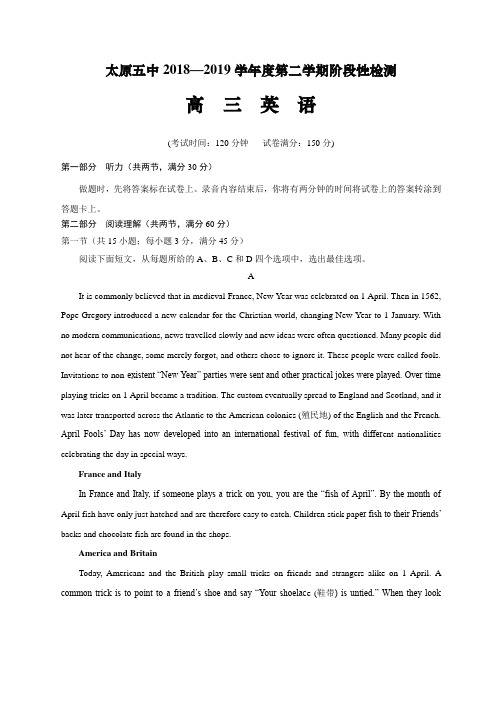
太原五中2018—2019学年度第二学期阶段性检测高三英语(考试时间:120分钟试卷满分:150分)第一部分听力(共两节,满分30分)做题时,先将答案标在试卷上。
录音内容结束后,你将有两分钟的时间将试卷上的答案转涂到答题卡上。
第二部分阅读理解(共两节,满分60分)第一节(共15小题;每小题3分,满分45分)阅读下面短文,从每题所给的A、B、C和D四个选项中,选出最佳选项。
AIt is commonly believed that in medieval France, New Year was celebrated on 1 April. Then in 1562, Pope Gregory introduced a new calendar for the Christian world, changing New Year to 1 January. With no modern communications, news travelled slowly and new ideas were often questioned. Many people did not hear of the change, some merely forgot, and others chose to ignore it. These people were called fools. Invitations to non-existent “New Year” parties were sent and other practical jokes were played. Over time playing tricks on 1 April became a tradition. The custom eventually spread to England and Scotland, and it was later transported across the Atlantic to the American colonies (殖民地) of the English and the French. April Fools’ Day has now developed into an international festival of fun, with differ ent nationalities celebrating the day in special ways.France and ItalyIn France and Italy, if someone plays a trick on you, you are the “fish of April”. By the month of April fish have only just hatched and are therefore easy to catch. Children stick pap er fish to their Friends’ backs and chocolate fish are found in the shops.America and BritainToday, Americans and the British play small tricks on friends and strangers alike on 1 April. A common trick is to point to a friend’s shoe and say “Your shoelac e(鞋带) is untied.” When they lookdown, they are laughed at. Schoolchildren might tell a friend that school has been cancelled. Sometimes the media get involved. Once, a British short film was shown on April Fools’ Day about spaghetti farmers and how they harvest their crop from spaghetti trees!ScotlandIn Scotland, April Fools’ Day lasts for two days! The second day is called “Taily Day” and tricks on this day involve the bottom (or the “tail”, in informal speech). Often a sign saying ‘kick me’ is stuck o nto someone’s back without them knowing.21. In what condition would someone be called “fish of April” in France?A. When one is fooled.B. If one is fond of fish.C. When one fools others.D. If one prefers chocolate.22. What was the purpose of the British short film?A. To help the audience.B. To trick the audience.C. To warn the audience.D. To inform the audience.23. Where does April Fools’ Day last for more than one day?A. Italy.B. France.C. America.D. Scotland.BI have never been a fan of the phrase, “No pains, no gains.” I prefer the alternative version, “No pains, no pains!” When it comes to exercise, for example, I learned years ago that pushing through pain was more likely to lay me up with an aching back than to leave me feeling strong and healthy.But there are times when stressful situations actually do lead to greater happiness. A new study published in the Journal of Happiness Studies found that people who pursue (追求) goals that are tough to achieve feel more stress in the moment, but greater happiness in the aftermath particularly if they feel connected to others along the way.The researchers concluded that happiness increases when people develop greater competence in something and greater competence only comes when people keep on working through the stress-inducing phase of trying, fighting, and trying again to learn and grow. If the psychological needs to be autonomous or self-directed, and to be connected to others are met, the momentary stresses will be less acute, and theresulting happiness will be more lasting.This idea reminds me of another often quoted phrase, which I have heard in reference to challenging tasks, such as exercise —“Fill-in-the-blank-stressful-task is the worst thing to do, but the greatest thing to have done.” In other words, suffering from the stress of an exercise class that leaves us feeling sweat-drenched shouldn’t lead us to walk away from exercising. And if we can pass those stressful moments with a friend, colleague or family member who is trustworthy and supportive, all will be better.As I travel my positive path, I’m certainly not seeking out stress. But life will offer me plenty of it, whether I ask for it or not. My task is to choose wisely when and how to face it head-on, knowing that happiness awaits on the other side.24. What makes the author prefer “No pains, no pains”?A. His terrible fear of pain.B. His deep love of exercise.C. His great desire for health.D. His past experience of pain.25. What results in people’s happiness according to the new study?A. Their tolerance for stress.B. The connection with others.C. Their ability to deal with stress.D. The achievement of their goals.26. What does the author think of challenging tasks?A. They are acute and lasting.B. They are tiring and boring.C. They are stressful but rewarding.D. They are interesting but unhelpful.27. How does the author treat stress in his life?A. Seek it out purposefully.B. Handle it wisely.C. Ask for help bravely.D. Wait until it disappears.CFashions have a lot of rules. Most of them, however, are just wrong. But there’s one rule that goes beyond tradition and into the field of scientific study of the brain: Black garments are slimming. It all comes down to how your visual system processes the light. The below holes in each square are the same in size, yet the white hole looks bigger than the black hole.In the 1500s, Galileo Galilei noticed that some of the planets looked larger when viewed with the naked eye (肉眼) than they did when viewed through a telescope, making the white light of Venus (金星) appear eight to ten times larger than Jupiter (木星) in the night sky. He knew something strange must be going on with his vision to cause this illusion, but he wasn’t sure what it was. Luckily, scientists never stopped wondering, and in 2014, they figured it out.Our visual system operates via two main channels: “on” neurons (神经元) that are sensitive to light things and “off” neurons that are sensitive to dark things. When it came to the dark “off” neurons, the researchers found that they responded predictably to dark shapes on a light background — the greater the contrast between the two, the more active these neurons were. But the light “on” neurons behaved unpredictably. Even with the same amount of contrast, light objects on a dark background caused a greater response in these neurons.Th is makes some sense, evolutionarily speaking. In the dark of night, you’d want to be able to take in every bit of light you can get, so a visual system that enlarges light objects on a dark background could be very useful. However, it’s not that hard to se e dark objects in the light of day. It has some effects in the colors of your clothes and in the appearance of the planets —the brighter appearance of Venus in the night sky makes it look bigger than the darker Jupiter.28. What did Galileo Galilei believe according to Paragraph 2?A. The neurons led to the difference.B. There was something wrong with his telescope.C. The difference was caused by his visual illusion.D. Things were bigger when seen through telescopes.29. What do we know about the “off” neurons?A. They are sensitive to light objects.B. Their behavior can’t be predicted.C. They behave differently from person to person.D. Their activeness improves with the contrast of colors.30. What does the author think of the phenomenon?A. It makes people feel puzzled.B. It brings great harm to people.C. It is more common among youths.D. It is beneficial to people’s evolution.31. What is the text mainly about?A. Why we look thinner when in black.B. What visual illusions bring to people.C. How we are affected by the fashion rules.D. Whether people’s visual system is different.D“No matter where you are or what time it is there’s something going on at a Hard Rock Cafe. All over the world our cafes not only serve great food, but they serve up great music.” Hard Rock Cafes around the world symbolize the timeless energy, originality and unifying(团结的) spirit that have helped to shape rock music over the last century.Founded by two Americans, the first Hard Rock Cafe (HRC) opened its doors to the public on June 14, 1971, in London. Today, HRC has become a global phenomenon with more than 180 cafes in different countries.HRC has also become the world’s leading collector and exhibitor of rock ‘n’ roll memorabilia. It all started when Eric Clapton, a regular at the first HRC, asked the staff if they could hang his guitar on the wall to mark his favourite stool (凳子) as “his spot”. They did and one week later, a package from Pete Townshend arrived with a guitar and a note with the message, “Mine’s as good as his! Love, Pete.”Ever since then, Hard Rock Cafes have been collecting pieces of rock memorabilia and covering their walls with them. Their collection is rotated from restaurant to restaurant and provides the world’s most comprehensive “visual history” of rock ‘n’ roll. These treasures include an awe-inspiring collection of classic guitars and other instruments, posters, music, etc.Throughout its history, HRC has been governed by a special service philosophy: “Love All — Serve All.” Since it was established, HRC has taken part in a wide variety of humane activities around the world.Following its idea of being more than just a restaurant, HRC tries to connect its business and its passion to make the earth a safer, healthier and better place to live.All in all, Hard Rock Cafe International is an entertainment company that continues to successfully expand the Hard Rock brand through countless music-related activities.32. What is the purpose of the first paragraph?A. To explain why HRC is a success.B. To show the characteristics of HRC.C. To describe the excellent service of HRC.D. To introduce what you can share in a HRC.33. Why did Pete send his guitar to the first HRC in London?A. He wanted to occupy a seat.B. He wanted to pay his bill with it.C. He wanted his guitar to be assessed.D. He wanted his guitar to be put on its wall.34. What do we know about the HRC’s collection?A. It is related to rock ‘n’ roll.B. It is housed in the first HRC.C. It was advocated by Eric Clapton.D. It was financed by regular customers.35. What does the HRC’s service philosophy imply?A. HRC welcomes everyone to the cafe.B. HRC is operated for a charitable purpose.C. HRC offers various activities to its customers.D. HRC provides the best service at the lowest price.第二节(共5小题,每小题3分,满分15分)根据短文内容,从短文后的选项中选出能填入空白处的最佳选项。
推荐精品2018_2019学年高二英语上学期第三次月考试题Word版
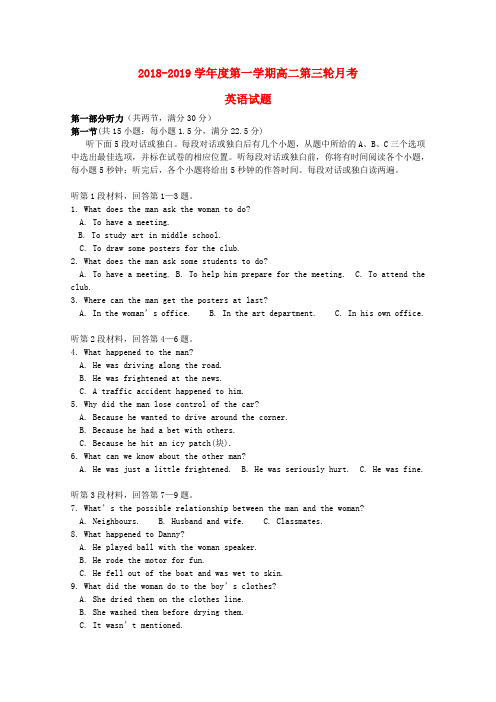
2018-2019学年度第一学期高二第三轮月考英语试题第一部分听力(共两节,满分30分)第一节(共15小题:每小题1.5分,满分22.5分)听下面5段对话或独白。
每段对话或独白后有几个小题,从题中所给的A、B、C三个选项中选出最佳选项,并标在试卷的相应位置。
听每段对话或独白前,你将有时间阅读各个小题,每小题5秒钟;听完后,各个小题将给出5秒钟的作答时间。
每段对话或独白读两遍。
听第1段材料,回答第1—3题。
1. What does the man ask the woman to do?A. To have a meeting.B. To study art in middle school.C. To draw some posters for the club.2. What does the man ask some students to do?A. To have a meeting.B. To help him prepare for the meeting.C. To attend the club.3. Where can the man get the posters at last?A. In the woman’s office.B. In the art department.C. In his own office.听第2段材料,回答第4—6题。
4. What happened to the man?A. He was driving along the road.B. He was frightened at the news.C. A traffic accident happened to him.5. Why did the man lose control of the car?A. Because he wanted to drive around the corner.B. Because he had a bet with others.C. Because he hit an icy patch(块).6. What can we know about the other man?A. He was just a little frightened.B. He was seriously hurt.C. He was fine.听第3段材料,回答第7—9题。
2018届山西省太原市第五中学高三下学期3月阶段性练习 英语Word版含答案
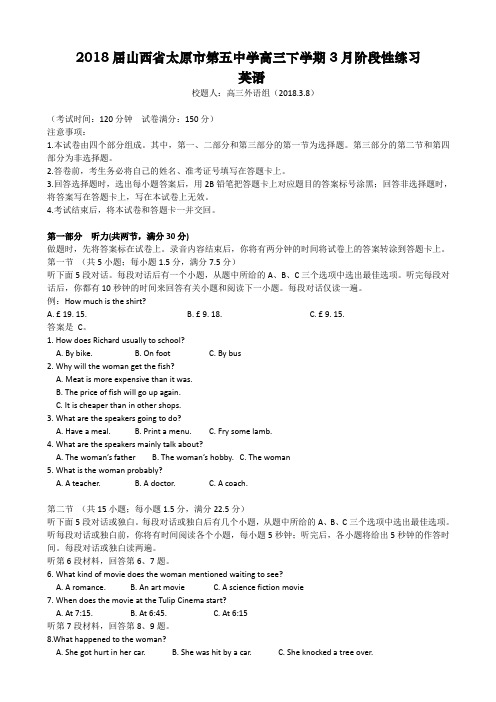
2018届山西省太原市第五中学高三下学期3月阶段性练习英语校题人:高三外语组(2018.3.8)(考试时间:120分钟试卷满分:150分)注意事项:1.本试卷由四个部分组成。
其中,第一、二部分和第三部分的第一节为选择题。
第三部分的第二节和第四部分为非选择题。
2.答卷前,考生务必将自己的姓名、准考证号填写在答题卡上。
3.回答选择题时,选出每小题答案后,用2B铅笔把答题卡上对应题目的答案标号涂黑;回答非选择题时,将答案写在答题卡上,写在本试卷上无效。
4.考试结束后,将本试卷和答题卡一并交回。
第一部分听力(共两节,满分30分)做题时,先将答案标在试卷上。
录音内容结束后,你将有两分钟的时间将试卷上的答案转涂到答题卡上。
第一节(共5小题;每小题1.5分,满分7.5分)听下面5段对话。
每段对话后有一个小题,从题中所给的A、B、C三个选项中选出最佳选项。
听完每段对话后,你都有10秒钟的时间来回答有关小题和阅读下一小题。
每段对话仅读一遍。
例:How much is the shirt?A. £ 19. 15.B. £ 9. 18.C. £ 9. 15.答案是C。
1. How does Richard usually to school?A. By bike.B. On footC. By bus2. Why will the woman get the fish?A. Meat is more expensive than it was.B. The price of fish will go up again.C. It is cheaper than in other shops.3. What are the speakers going to do?A. Have a meal.B. Print a menu.C. Fry some lamb.4. What are the speakers mainly talk about?A. The woman’s fatherB. The woman’s hobby.C. The woman5. What is the woman probably?A. A teacher.B. A doctor.C. A coach.第二节(共15小题;每小题1.5分,满分22.5分)听下面5段对话或独白。
山西省太原五中2018-2019学年高二下学期期中考试英语试题

精校word版---太原五中2018—2019学年度第二学期阶段性检测英语
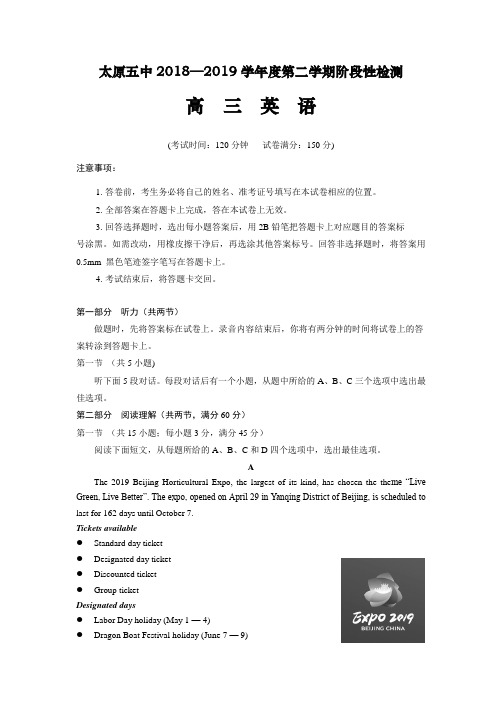
太原五中2018—2019学年度第二学期阶段性检测高三英语(考试时间:120分钟试卷满分:150分)注意事项:1.答卷前,考生务必将自己的姓名、准考证号填写在本试卷相应的位置。
2.全部答案在答题卡上完成,答在本试卷上无效。
3.回答选择题时,选出每小题答案后,用2B铅笔把答题卡上对应题目的答案标号涂黑。
如需改动,用橡皮擦干净后,再选涂其他答案标号。
回答非选择题时,将答案用0.5mm 黑色笔迹签字笔写在答题卡上。
4.考试结束后,将答题卡交回。
第一部分听力(共两节)做题时,先将答案标在试卷上。
录音内容结束后,你将有两分钟的时间将试卷上的答案转涂到答题卡上。
第一节(共5小题)听下面5段对话。
每段对话后有一个小题,从题中所给的A、B、C三个选项中选出最佳选项。
第二部分阅读理解(共两节,满分60分)第一节(共15小题;每小题3分,满分45分)阅读下面短文,从每题所给的A、B、C和D四个选项中,选出最佳选项。
AThe 2019 Beijing Horticultural Expo, the largest of its kind, has chosen the the me “Live Green, Live Better”. The expo, opened on April 29 in Yanqing District of Beijing, is scheduled to last for 162 days until October 7.Tickets available●Standard day ticket●Designated day ticket●Discounted ticket●Group ticketDesignated days●Labor Day holiday (May 1 — 4)●Dragon Boat Festival holiday (June 7 — 9)●Mid-Autumn Festival holiday (Sept 13 — 15)●National Day holiday (Oct 1 — 7)Tickets prices●Standard day ticket 120 yuan●Ordinary designated day ticket 160 yuan●Discounted standard day ticket 80 yuan●Discounted designated day ticket 120 yuanTickets are free for children under the age of six or shorter than 130 centimeters. Discounted tickets are available for those with disabilities, seniors (people aged at 60 or above), children, students and PLA soldiers.Where to buyVisitors can buy or book tickets from two online agents, seven travel agencies, or three event channels — the event WeChat account, the event app or Onsite ticket kiosks.Opening hoursBuying tickets for Expo 2019 Beijing requires real-name registration, and all visitors are required to input information from their ID cards (or valid passports, mainland travel permits for Hong Kong and Macao residents, and mainland travel permits for Taiwan residents) to buy or book tickets online.21. From the passage, what can we learn?A. A resident from Macao can only book his ticket with his mainland travel permits.B. Tickets cannot be booked through the event WeChat account.C. One can be admitted in at any time with an unlimited entry pass.D. Visitors must use their real names to buy tickets.22. If a PLA soldier takes his wife, his 64-year-old father and five-old-year son to the expo on June 7, how much will he pay for their tickets?A. 360.B. 480.C. 400.D. 520.23. Where is the passage most probably taken from?A. A notice board.B. A report.C. A magazine.D. A book review.BFriends always ask why I, a middle-aged woman with no athletic talent, travel to perilous places — the jungles of Thailand or Borneo, for example, where the water is often unsafe and the food risky; places with infectious diseases, poisonous snakes and the wildest animals; some places where the locals are just a few generations past headhunting.I never know how to answer. My travel decisions assumed a new gravity nine years ago after高三英语第3页(共22页)高三英语第4页(共22页)I suffered a stroke. To prevent another stroke, my doctors told me, I’d have to take dangerously high levels of blood thinner (血液稀释剂) for the rest of my life and any travel would be risky.I had to think about what was important to me: family, of course, and friends. But then what? No matter how many times I thought about it, no bucket list was complete without travel. Then I had to decide how I might manage the risk. I had to decide how lucky I felt.My return to travel after my stroke came in baby steps. The first real test of my travel courage came nine months after my stroke when I joined my husband, Jack, on a business trip to China. After we’d toured the remains of a Tang dynasty temple on a high mountain, Jack wanted to ride down on a toboggan (长雪橇).Before the stroke it would’ve seemed like fun. But now? I hesitated. M y mental klaxon (高音喇叭) screamed warnings about the consequences of a cut, a fall, and a crash. Then, gaining confidence from who knows where, I lowered myself carefully into the toboggan, which marked my adventure travel comeback.In the years since then, I’ve traveled about twenty-five percent of the time. Through it all, my lucks held out — no deadly falls, no car accidents or serious infections. For me, adventure travel is a risk worth taking. Travel broadens my world and keeps me connected to nature. Wh at’s more, saying “yes” to travel keeps me connected to myself.24. What does the underlined word “perilous” in Paragraph 1 probably mean?A. Unique.B. Dangerous.C. Historical.D. Famous.25. What did the doctors advise the author to do?A. Do proper exercise.B. Enjoy the rest of her life.C. Keep away from traveling.D. Spend more time with her family.26. Why did the author mention her travel to China?A. It was her last adventure.B. She recovered her courage through it.C. She liked the beautiful scenery in China.D. It was the most dangerous experience in her life.27. What is the best title for the text?A. A business trip to ChinaB. Unique travel experiencesC. Why I still travel to the wildD. How I overcame the fear of diseaseCThe new president of Harvard University is the son of an Eastern European refugee and Auschwitz (奥斯威辛) survivor —Lawrence S. Bacow. His father worked full time while attending a state college in Detroit at night to earn his degree.Bacow, the former president of Tufts University, has taken over Harvard at a time when higher education is under attack for being financially out of reach to many Americans. But Bacow said his family’s journey had reflected the power of college education to transform generations and the opportunities that have historically been available in the United States.“My parents came to this country with almost nothing,” Bacow said. “I wouldn’t be here if this country had not been open to people like my parents at that time. Nor would I if my father hadn’t had the opportunity to get the college education.”Bacow grew up in Pontiac, Michigan. His father’s family fled anti-Jewish (反犹太的) violence in Minsk, then part of the Soviet Union, before the start of World War II and went to the United States. His mother arrived in Brooklyn at age 19, having survived Auschwitz concentration camp. She was the only Jew from her town to have survived the war. Yet Bacow, who is married with two sons, said that while growing up in Michigan, he had a happy childhood, entering science fairs as a child and building radios like his dad.Bacow has spent most of his professional career at MIT, Harvard and Tufts. He was a professor of environmental studies at MIT, and later a principal at the university. He led Tufts from 2001 to 2011. At Tufts, Bacow earned a reputation for shaking up a sleepy university that was being overshadowed by its peers in Boston. He is also credited with leading it through both 9/11 and the 2008 financial crisis.As the Tufts president, Bacow traveled around the country, reaching out to alumni (校友), and he urged his faculty and deans to do the same, in an effort to boost donations to finance Tufts’ academic ambitions. He raised more than $20 million for faculty recruitment, attracting up-and-coming professors by offering junior faculty perks (福利), such as long academic leaves that they couldn’t get elsewhere.Under Bacow’s leadership, Tufts spent millions on labs and libraries. He also made addresses nationally about the need to make higher education more accessible and affordable to low-income students.28. The reason why Bacow appreciates college education is that .A. college education is out of reach to many AmericansB. his family changed their fate due to college educationC. few opportunities were available when his father came into the countryD. a college degree helped his mother survive Auschwitz29. What can we infer from the passage?A. The fellow townspeople of Bacow were all killed besides his mother.高三英语第7页(共22页)高三英语第8页(共22页)B. Bacow’s mother stimulated his interest in science.C. Bacow’s father was good at working with electronics.D. Bacow’s father came to the U.S. after World War II broke out.30. The underlined word “shaking up” in paragraph 5 probably means .A. reactivatingB. causingC. damagingD. taking over31. What is this passage mainly about?A. How to be admitted to Harvard University.B. The history of Bacow’s family.C. The art of Bacow’s leadership in Tufts.D. Bacow’s way to indivi dual success.DProfessional athletes pay a high price for their pursuit of excellence and glory. Training to the limit tears muscles and wears out joints. Gymnasts often need hip replacements when barely into middle age. Few footballers make it to the end of their careers with their knees intact.But many also run a darker risk: doping —the use of banned athletic performance-enhancing drugs by athletic competitors. The Winter Olympics in Pyeongchang, in South Korea, starts this week in its shadow. Years after whistle-blowers first revealed wholesale (大规模的) doping in Russia, the International Olympic Committee (IOC) at last decided to bar it from taking part. But it has allowed many Russians to compete as individuals. And on the eve of the competition the Court of Arbitration for Sport (CAS) said that 28 others should receive a more tolerant penalty from the IOC, further muffling the anti-doping message.Russia’s doping is unusual only in its scale and institutional nature. No country or sport is immune. Studies, and an anonymous survey at the World Athletics Championships in 2011, suggest that a third of athletes preparing for big international competitions take banned substances. Yet just 1-2% fail a test each year. Lance Armstrong, a cyclist who won the Tour de France seven times and later admitted to doping all the while, was tested on 250 occasions. The few times he failed, he avoided punishments by claiming he had taken anti-inflammatories (消炎药) for saddle-sores (骑行引起的肌肉酸痛).Doping is more sophisticated than when some states used steroids (类固醇) to bulk up athletes. New drugs are designed to be undetectable in a blood or urine sample. Many athletes “blood dope,” receiving transfusions or taking a drug that stimulates the production of red blood cells to improve their physical strength. Soviet athletes who were fed steroids suffered a host of serious problems in later life. They were more likely to commit suicide, or to miscarry (流产) or have a disabled child. No one knows what risks those taking new “designer” versions are running. Blood-doping can cause heart attacks; more than a dozen cyclists’ deaths have already been linked to it.The agencies that set out to stop doping are hugely outclassed. As the argument over punishments on Russia illustrate, they are divided and weak. Most testing is done by national bodies, which may not try very hard to find evidence that would get their own stars banned. The World Anti-Doping Agency (WADA), which oversees them, is packed with officials fromnational sports federations and the IOC. Their interests are likewise conflicted. Its budget is tiny. The system seems to be designed to look tough but punish only the occasional scapegoat (替罪羊). Honest athletes deserve better.32. The word “muffling” (in paragraph 2) is closest in meaning to “.”A. deafeningB. conveyingC. spreadingD. weakening33. Why did the author cite an instance of Lance Armstrong?A. To illustrate he is a model of Russian athlete.B. To show cycling is very popular in France.C. To indicate doping exists everywhere.D. To suggest doping is an exception for American athletes.34. Which of the following is NOT a side-effect of steroids?A. Giving birth to an unhealthy child.B. Suicidal tendencies.C. Stimulates the production of red blood cells.D. Unintentionally having a pregnancy end early.35. What can be inferred from the passage?A. The CAS should put more severe penalties on Russian athletes.B. The Winter Olympics in Pyeongchang have not been successful due to doping scandals.C. Doping is quite common among athletes in France and Russia.D. W ADA does a good job monitoring doping in the Olympics.第二节(共5小题,每小题3分,满分15分)根据短文内容,从短文后的选项中选出能填入空白处的最佳选项。
山西省太原五中2018届高三3月阶段练习英语试卷(带答案)
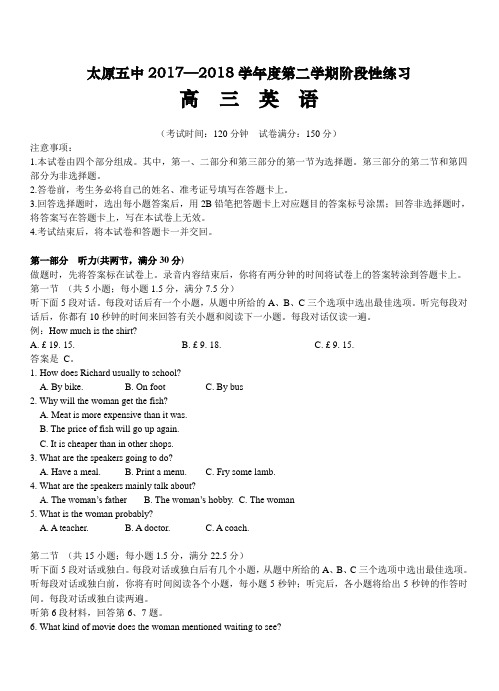
太原五中2017—2018学年度第二学期阶段性练习高三英语(考试时间:120分钟试卷满分:150分)注意事项:1.本试卷由四个部分组成。
其中,第一、二部分和第三部分的第一节为选择题。
第三部分的第二节和第四部分为非选择题。
2.答卷前,考生务必将自己的姓名、准考证号填写在答题卡上。
3.回答选择题时,选出每小题答案后,用2B铅笔把答题卡上对应题目的答案标号涂黑;回答非选择题时,将答案写在答题卡上,写在本试卷上无效。
4.考试结束后,将本试卷和答题卡一并交回。
第一部分听力(共两节,满分30分)做题时,先将答案标在试卷上。
录音内容结束后,你将有两分钟的时间将试卷上的答案转涂到答题卡上。
第一节(共5小题;每小题1.5分,满分7.5分)听下面5段对话。
每段对话后有一个小题,从题中所给的A、B、C三个选项中选出最佳选项。
听完每段对话后,你都有10秒钟的时间来回答有关小题和阅读下一小题。
每段对话仅读一遍。
例:How much is the shirt?A. £ 19. 15.B. £ 9. 18.C. £ 9. 15.答案是C。
1. How does Richard usually to school?A. By bike.B. On footC. By bus2. Why will the woman get the fish?A. Meat is more expensive than it was.B. The price of fish will go up again.C. It is cheaper than in other shops.3. What are the speakers going to do?A. Have a meal.B. Print a menu.C. Fry some lamb.4. What are the speakers mainly talk about?A. The woman’s fatherB. The woman’s hobby.C. The woman5. What is the woman probably?A. A teacher.B. A doctor.C. A coach.第二节(共15小题;每小题1.5分,满分22.5分)听下面5段对话或独白。
【高三英语试题精选】2018届高三英语下学期阶段性练习(3月)试题(太原五中含答案)

2018届高三英语下学期阶段性练习(3月)试题(太原五中含答案)太原五中Fri 8 am-8 pm Or email puzzler@servicehelplinecouk or write to the address at the top of the page*Manage your subscription online at puzzlerTo reneyour subscription, check your address details or find out homany issues you have remaining, simply visit the subscriptions area and click on Account Registration *Puzzles by PostAs a subscriber to Puzzler Quiz Kids we would like to offer you the chance to expand upon your puzzling ability with a subscription to Junior Puzzles or Dennis and Gnasher Puzzles To subscribe, please ask an adult to visit puzzler or telephone / write to our customer services team (at the address above), giving the reference that acpanies your chosen offer Junior PuzzlesA large package of entertainment! Over 100 pages containing a wide variety of puzzles including spot the difference, wordsearch, dot-to-dot and many more For 7-12 year oldsDennis and Gnasher PuzzlesJoin Dennis and Gnasher for 64 pages of puzzles, jokes and funny stories Plus there is a free gift with every issue For 7-12 year oldsTitleJunior PuzzlesDennis and Gnasher PuzzlesOfferStandard priceSave 10%1 free issueOffer price*£2Fi to customers Students like Colt went。
山西省太原五中2018届高三3月阶段练习英语试卷含答案
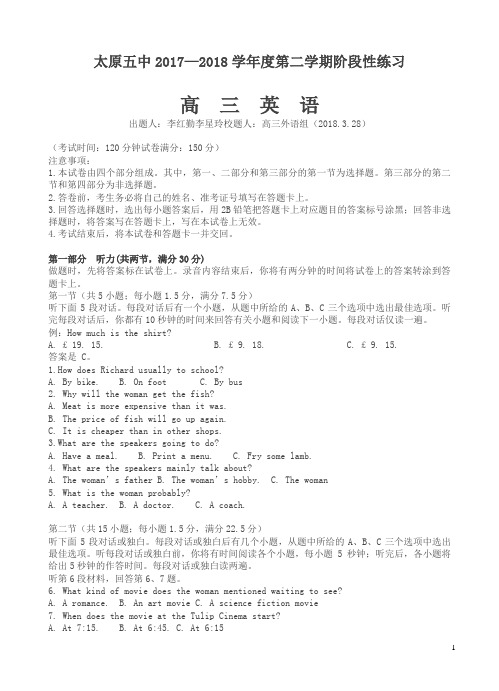
太原五中2017—2018学年度第二学期阶段性练习高三英语出题人:李红勤李星玲校题人:高三外语组(2018.3.28)(考试时间:120分钟试卷满分:150分)注意事项:1.本试卷由四个部分组成。
其中,第一、二部分和第三部分的第一节为选择题。
第三部分的第二节和第四部分为非选择题。
2.答卷前,考生务必将自己的姓名、准考证号填写在答题卡上。
3.回答选择题时,选出每小题答案后,用2B铅笔把答题卡上对应题目的答案标号涂黑;回答非选择题时,将答案写在答题卡上,写在本试卷上无效。
4.考试结束后,将本试卷和答题卡一并交回。
第一部分听力(共两节,满分30分)做题时,先将答案标在试卷上。
录音内容结束后,你将有两分钟的时间将试卷上的答案转涂到答题卡上。
第一节(共5小题;每小题1.5分,满分7.5分)听下面5段对话。
每段对话后有一个小题,从题中所给的A、B、C三个选项中选出最佳选项。
听完每段对话后,你都有10秒钟的时间来回答有关小题和阅读下一小题。
每段对话仅读一遍。
例:How much is the shirt?A. £ 19. 15.B. £ 9. 18.C. £ 9. 15.答案是 C。
1.How does Richard usually to school?A. By bike.B. On footC. By bus2. Why will the woman get the fish?A. Meat is more expensive than it was.B. The price of fish will go up again.C. It is cheaper than in other shops.3.What are the speakers going to do?A. Have a meal.B. Print a menu.C. Fry some lamb.4. What are the speakers mainly talk about?A. The woman’s fatherB. The woman’s hobby.C. The woman5. What is the woman probably?A. A teacher.B. A doctor.C. A coach.第二节(共15小题;每小题1.5分,满分22.5分)听下面5段对话或独白。
太原五中2018—2019学年度第一学期阶段性检测高二英语试题
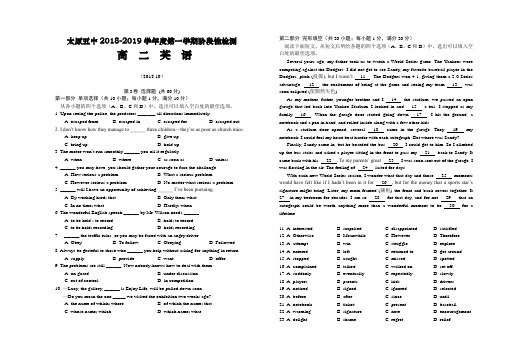
太原五中2018-2019学年度第一学期阶段性检测高二英语(2018.10)第I卷选择题(共60分)第一部分单项选择(共10小题;每小题1分,满分10分)从各小题的四个选项(A、B、C和D)中,选出可以填入空白处的最佳选项。
1. Upon seeing the police, the predators _______ all directions immediately.A. escaped fromB. escaped inC. escaped forD. escaped out2. I don’t know how they manage to ______ three children—they’re as poor as church mice.A. keep upB. give upC. bring upD. hold up3. The motor won’t run smoothly ______ you oil it regularly.A. whenB. whereC. as soon asD. unless4. ______ you may have, you should gather your courage to face the challenge.A. How serious a problemB. What a serious problemC. However serious a problemD. No matter what serious a problem5. ______ will I have an opportunity of achieving ______ I’ve been pursuing.A. By working hard; thatB. Only then; whatC. In no time; whatD. Hardly; when6. The wonderful English speech ______ by Mr. Wilson needs ______.A. to be held ; to recordB. held; to recordC. to be held; recordingD. held; recording7. ______ the traffic rules, or you may be faced with an angry driver.A. ObeyB. To followC. ObeyingD. Followed8. Always be grateful to those who ______ you help without asking for anything in return.A. supplyB. provideC. wantD. offer9. The problems are still ______. Now nobody knows how to deal with them.A. on guardB. under discussionC. out of controlD. in competition10. —Lucy, the gallery, ______ is Enjoy Life, will be pulled down soon.—Do you mean the one _____ we visited the exhibition two weeks ago?A. the name of which; whereB. of which the name; thatC. whose name; whichD. which name; what 第二部分完形填空(共20小题;每小题1分,满分20分)阅读下面短文,从短文后所给各题的四个选项(A、B、C和D)中,选出可以填入空白处的最佳选项。
山西省太原市第五中学高二英语下学期3月第三周考试试题
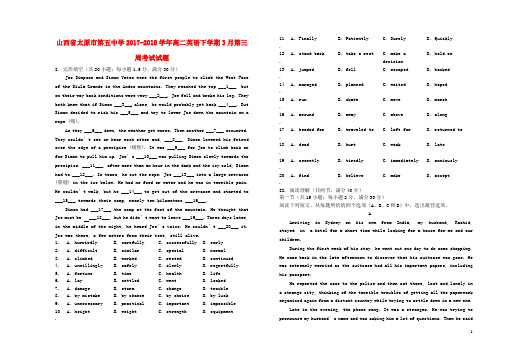
山西省太原市第五中学2017-2018学年高二英语下学期3月第三周考试试题I. 完形填空(共20小题;每小题1.5分,满分30分)Joe Simpson and Simon Yates were the first people to climb the West Face of the Siula Grande in the Andes mountains. They reached the top ___1___, but on their way back conditions were very ___2___. Joe fell and broke his leg. They both knew that if Simon ___3___ alone, he would probably get back ___4___. But Simon decided to risk his ___5___ and try to lower Joe down the mountain on a rope (绳).As they ___6___ down, the weather got worse. Then another ___7___ occurred. They couldn’t see or hear each other and, ___8___, Simon lowered his friend over the edge of a precipice (峭壁). It was ___9___ for Joe to climb back or for Simon to pull him up. Joe’s ___10___ was pulling Simon slowly towards t he precipice. ___11___, after more than an hour in the dark and the icy cold, Simon had to ___12___. In tears, he cut the rope. Joe ___13___ into a large crevasse (裂缝) in the ice below. He had no food or water and he was in terrible pain. He couldn’t walk, but he ___14___ to get out of the crevasse and started to ___15___ towards their camp, nearly ten kilometers ___16___.Simon had ___17___ the camp at the foot of the mountain. He thought that Joe must be ___18___, but he didn’t want to leave ___19___. T hree days later, in the middle of the night, he heard Joe’s voice. He couldn’t ___20___ it. Joe was there, a few meters from their tent, still alive.1. A. hurriedly B. carefully C. successfully D. early2. A. difficult B. similar C. special D. normal3. A. climbed B. worked C. rested D. continued4. A. unwillingly B. safely C. slowly D. regretfully5. A. fortune B. time C. health D. life6. A. lay B. settled C. went D. looked7. A. damage B. storm C. change D. trouble8. A. by mistake B. by chance C. by choice D. by luck9. A. unnecessary B. practical C. important D. impossible10 . A. height B. weight C. strength D. equipment11.A. FinallyB. PatientlyC. SurelyD. Quickly12.A. stand backB. take a restC. make adecisionD. hold on13.A. jumpedB. fellC. escapedD. backed14.A. managedB. plannedC. waitedD. hoped15.A. runB. skateC. moveD. march16.A. aroundB. awayC. aboveD. along17.A. headed forB. traveled toC. left forD. returned to18.A. deadB. hurtC. weakD. late19.A. secretlyB. tiredlyC. immediatelyD. anxiously20.A. findB. believeC. makeD. acceptII. 阅读理解(共两节,满分40分)第一节(共15小题;每小题2分,满分30分)阅读下列短文,从每题所给的四个选项(A、B、C和D)中,选出最佳选项。
山西省太原五中2018届高三3月阶段性练习 英语
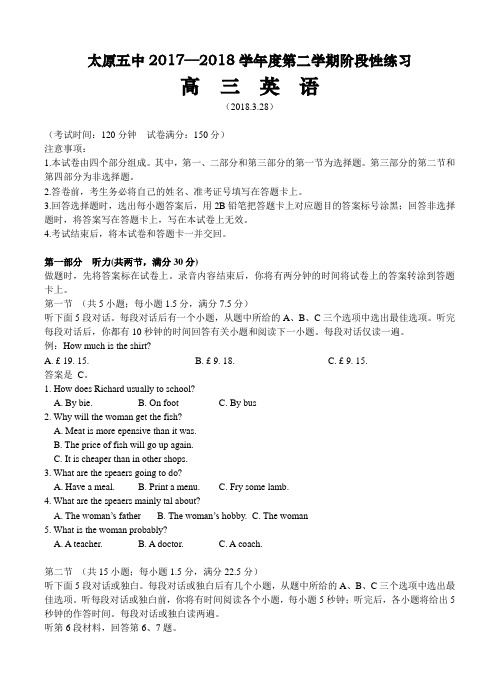
太原五中2017—2018学年度第二学期阶段性练习高三英语(2018.3.28)(考试时间:120分钟试卷满分:150分)注意事项:1.本试卷由四个部分组成。
其中,第一、二部分和第三部分的第一节为选择题。
第三部分的第二节和第四部分为非选择题。
2.答卷前,考生务必将自己的姓名、准考证号填写在答题卡上。
3.回答选择题时,选出每小题答案后,用2B铅笔把答题卡上对应题目的答案标号涂黑;回答非选择题时,将答案写在答题卡上,写在本试卷上无效。
4.考试结束后,将本试卷和答题卡一并交回。
第一部分听力(共两节,满分30分)做题时,先将答案标在试卷上。
录音内容结束后,你将有两分钟的时间将试卷上的答案转涂到答题卡上。
第一节(共5小题;每小题1.5分,满分7.5分)听下面5段对话。
每段对话后有一个小题,从题中所给的A、B、C三个选项中选出最佳选项。
听完每段对话后,你都有10秒钟的时间回答有关小题和阅读下一小题。
每段对话仅读一遍。
例:How much is the shirt?A. £ 19. 15.B. £ 9. 18.C. £ 9. 15.答案是C。
1. How does Richard usually to school?A. By bie.B. On footC. By bus2. Why will the woman get the fish?A. Meat is more epensive than it was.B. The price of fish will go up again.C. It is cheaper than in other shops.3. What are the speaers going to do?A. Have a meal.B. Print a menu.C. Fry some lamb.4. What are the speaers mainly tal about?A. The woman’s fatherB. The woman’s hobby.C. The woman5. What is the woman probably?A. A teacher.B. A doctor.C. A coach.第二节(共15小题;每小题1.5分,满分22.5分)听下面5段对话或独白。
山西省太原市第五中学2018届高三英语下学期3月阶段性练习试题1

山西省太原市第五中学2018届高三英语下学期3月阶段性练习试题1注意事项:1.答卷前,考生务必将自己的姓名、准考证号填写在答题卡上。
2.回答选择题时,选出每小题答案后,用铅笔把答题卡上对应题目的答案涂黑。
如需改动,用橡皮擦干净后,再选其他答案标号。
回答非选择题时,将答案写在答题卡上,写在本试卷上无效。
第一部分听力(共两节,满分30分)做题时,先将答案标在试卷上。
录音内容结束后,你将有两分钟的时间将试卷上的答案转涂到答题卡上。
第一节(共5小题;每小题1.5分,满分7.5分)听下面5段对话。
每段对话后有一个小题,从题中所给的A、B、C三个选项中选出最佳选项。
听完每段对话后,你都有10秒钟的时间来回答有关小题和阅读下一小题。
每段对话仅读一遍。
例:How much is the shirt?A. £19.15.B. £9.18.C. £9.15.答案是C。
1. What are the speakers talking about?A. A sofa.B. A bed.C. A cushion.2. Where will the man stop probably?A. At a café.B. At a supermarket.C. At a gas station.3. What will the woman probably do?A. Take the garbage out.B. Walk the dog.C. Do the washing.4. What is the man doing now?A. Driving a car.B. Writing an essay.C. Tidying the room.5. How does the man feel?A. Unhappy.B. Anxious.C. Ashamed. 第二节(共15小题;每小题1.5分,满分22.5分)听下面5段对话或独白。
山西省太原五中2018届高三3月阶段练习英语试卷(含答案)
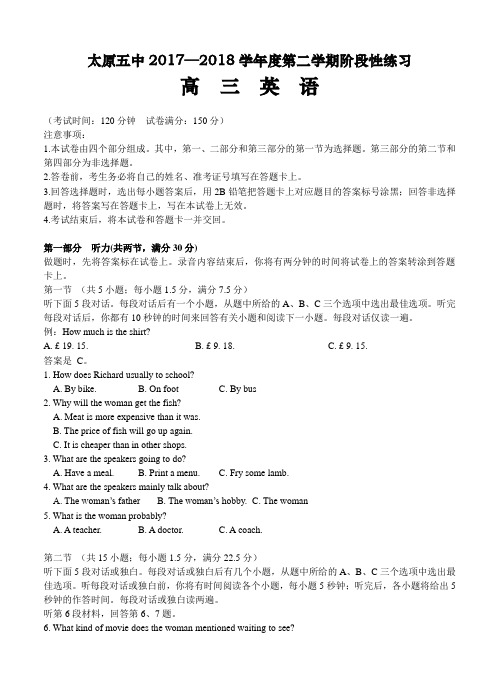
太原五中2017—2018学年度第二学期阶段性练习高三英语(考试时间:120分钟试卷满分:150分)注意事项:1.本试卷由四个部分组成。
其中,第一、二部分和第三部分的第一节为选择题。
第三部分的第二节和第四部分为非选择题。
2.答卷前,考生务必将自己的姓名、准考证号填写在答题卡上。
3.回答选择题时,选出每小题答案后,用2B铅笔把答题卡上对应题目的答案标号涂黑;回答非选择题时,将答案写在答题卡上,写在本试卷上无效。
4.考试结束后,将本试卷和答题卡一并交回。
第一部分听力(共两节,满分30分)做题时,先将答案标在试卷上。
录音内容结束后,你将有两分钟的时间将试卷上的答案转涂到答题卡上。
第一节(共5小题;每小题1.5分,满分7.5分)听下面5段对话。
每段对话后有一个小题,从题中所给的A、B、C三个选项中选出最佳选项。
听完每段对话后,你都有10秒钟的时间来回答有关小题和阅读下一小题。
每段对话仅读一遍。
例:How much is the shirt?A. £ 19. 15.B. £ 9. 18.C. £ 9. 15.答案是C。
1. How does Richard usually to school?A. By bike.B. On footC. By bus2. Why will the woman get the fish?A. Meat is more expensive than it was.B. The price of fish will go up again.C. It is cheaper than in other shops.3. What are the speakers going to do?A. Have a meal.B. Print a menu.C. Fry some lamb.4. What are the speakers mainly talk about?A. The woman’s fatherB. The woman’s hobby.C. The woman5. What is the woman probably?A. A teacher.B. A doctor.C. A coach.第二节(共15小题;每小题1.5分,满分22.5分)听下面5段对话或独白。
